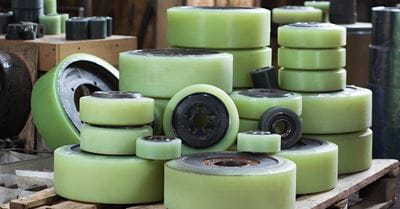Forklift Tires | Oxnard

We supply tires for all forklifts, not just Raymond!
Raymond maintains one of the largest material handling parts divisions in the West.
Call now and let us help you find the parts you need:
(805) 667-0888.
Lift trucks come in many different sizes and shapes, and each sort of forklift has a unique set of tires. Usually, tires are classified as pneumatic or cushion, although distinctions extist within those categories. Pneumatic tire and cushion tire forklifts have different types of frames, so they lack cross-compatibility.
Despire the fact that your tires are tough and durable, they must be be replaced periodically. Raymond West offers tires for all types of lift trucks at extremely affordable prices.
Cushion Tires
Sometimes called Press On Tires, this sort of tire is most often used indoors, and occasionally outside on level surface materials. Cushion tires are shorter in diameter than other varieties of lift truck tires, and thus possess a narrower turning radius. This makes them better for confined circumstances such as warehouse aisles. Mounting a press on tire onto a forklift wheel requires a hydraulic press.
Among the cushion tire categorization, there are a couple of general types:
Rubber Cushion Tires: Rubber cushion tires are often used within a warehouse or on even outdoor surfaces such as asphalt or concrete. They are constructed with solid rubber, molded around a solid steel band. This type of tire is available smooth or with a tread. Usually the forward tires will be treaded while the back tires responsible for steering lack treading.
Polyurethane Cushion Tires: Solid poly tires can hold bigger loads than rubber tires, and they are ideal for use in narrow aisles, order pickers and other warehouse tasks. Lightweight tires like these are more resistant to chunking, splitting and tearing when compared to rubber, and their life can be up to twice as long as rubber when taken care of.
Pneumatic Tires
Pneumatic and solid pneumatic tires often are used outside, and are better suited to uneven or rough surface materials compared to press on tires. They have excellent traction and taller ground clearance which makes them well suited to rougher terrain.
Regular Pneumatic Tires: This type of pneumatic is filled with air, and is ideal for very rough surfaces where shock absorption is a concern, for both the integrity of the forklift and the operator’s comfort. The one downside of these tires is that they are more easily punctured, and sometimes they are filled with foam in order to prevent flats.
Solid Pneumatic Tires: Solid pneumatic tires are optimized for even surface indoor / outdoor heavy duty situations. Made from solid rubber and basically puncture resistant, they are best used for places with pointy objects, like recycling yards or construction sites.
Non Marking Tires
Solid, solid pneumatic, and pneumatic tires have non-marking options available. They are made with hydrated silicas and other additives to avoid leaving floors covered in black marks.
These types of tires are commonly used in retail facilities or any settings where clean floors are important. They may also be used in a selection of industrial or food processing plants where dust reduction and cleanliness are concerns.
There are a few detractors to using non-marking tires. Firstly, they don’t tend to share the durability of other tire varieties and will need to be replaced more often. Another problem is that they experience static electricity buildup, and a forklift that has them must be equipped with static abatement technology.
Forklift Tires Near Me
When maintained properly, your forklift tires can decrease energy consumption, dramatically improve operator comfort, and boost your overall efficiency. To talk to a lift truck tire expert, give Raymond West a call today!
Raymond West's Oxnard / Ventura service area includes Camarillo, Thousand Oaks, Moorpark, Newbury Park, Ventura, Santa Paula, Westlake Village, Simi Valley and all surrounding areas.
Raymond West | Oxnard Forklift Dealer
Ventura County, CA
(805) 667-0888

